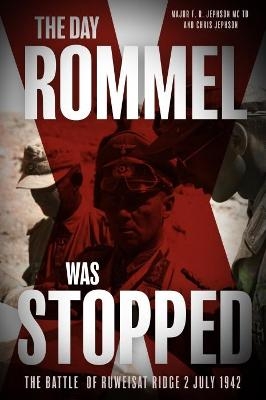
The Day Rommel was Stopped
The Battle of Ruweisat Ridge, 2 July 1942
Seiten
2022
Casemate Publishers (Verlag)
978-1-63624-127-2 (ISBN)
Casemate Publishers (Verlag)
978-1-63624-127-2 (ISBN)
The battle of 2nd July 1942 at Ruweisat Ridge in North Africa is not well known but it was the day that Rommel was finally stopped. This account was written by an officer in the small British unit that turned back Rommel's forces.
George VI's biographer, Sir John Wheeler Bennett wrote "The actual turning of the tide in the 2nd World War may be accurately determined as the first week of July 1942." This book argues that it is possible to be even more exact: the tide turned at about 21.00 hrs on 2 July 1942, when Rommel's tanks withdrew for the first time since the fall of Tobruk on 20 June, or arguably since 14 January 1942 at El Agheila. At dusk on Wednesday 1 July 1942, Rommel broke through the centre of the British defences at Alamein. His tanks had overwhelmed the gallant defence of the 18th Indian Infantry Brigade in the Deir el Shein at the foot of the Ruweisat Ridge. At that moment, and for the next twelve hours, there was no further organised defence between the spearhead of the Afrika Korps and Alexandria. Throughout the next day, only a handful of men and guns stood between Rommel and his prize. In Cairo, black clouds of smoke from burning files showed that many people believed Rommel would not stop short of the Suez Canal, his stated objective. But, on Friday 3 July at 22.56 hrs, only 48 hours later, Rommel called off his attack and ordered his troops to dig in where they stood. The Delta was saved. Just a few weeks earlier, the 18th Indian Infantry Brigade, which took the brunt of the initial attack on 1 July, and the guns of the small column known as Robcol that stopped Rommel on 2 and 3 of July, had been in northern Iraq. General Auchinleck's desperate measure, pulling them 1,500 miles from Iraq into the Western desert, just succeeded but it greatly increased the price of failure. If Robcol had failed, it is doubtful that Rommel would have stopped at the canal; it does not require much imagination to see his forces threatening to link up with Barbarossa in the Ukraine. This vivid account of the battle of Ruweisat Ridge, the beginning of the battle of Alamein, was written by an officer who was part of Robcol on the fateful day.
George VI's biographer, Sir John Wheeler Bennett wrote "The actual turning of the tide in the 2nd World War may be accurately determined as the first week of July 1942." This book argues that it is possible to be even more exact: the tide turned at about 21.00 hrs on 2 July 1942, when Rommel's tanks withdrew for the first time since the fall of Tobruk on 20 June, or arguably since 14 January 1942 at El Agheila. At dusk on Wednesday 1 July 1942, Rommel broke through the centre of the British defences at Alamein. His tanks had overwhelmed the gallant defence of the 18th Indian Infantry Brigade in the Deir el Shein at the foot of the Ruweisat Ridge. At that moment, and for the next twelve hours, there was no further organised defence between the spearhead of the Afrika Korps and Alexandria. Throughout the next day, only a handful of men and guns stood between Rommel and his prize. In Cairo, black clouds of smoke from burning files showed that many people believed Rommel would not stop short of the Suez Canal, his stated objective. But, on Friday 3 July at 22.56 hrs, only 48 hours later, Rommel called off his attack and ordered his troops to dig in where they stood. The Delta was saved. Just a few weeks earlier, the 18th Indian Infantry Brigade, which took the brunt of the initial attack on 1 July, and the guns of the small column known as Robcol that stopped Rommel on 2 and 3 of July, had been in northern Iraq. General Auchinleck's desperate measure, pulling them 1,500 miles from Iraq into the Western desert, just succeeded but it greatly increased the price of failure. If Robcol had failed, it is doubtful that Rommel would have stopped at the canal; it does not require much imagination to see his forces threatening to link up with Barbarossa in the Ukraine. This vivid account of the battle of Ruweisat Ridge, the beginning of the battle of Alamein, was written by an officer who was part of Robcol on the fateful day.
Born in 1918, Major Jephson attended Rossall School and then joined the Manchester Artillery, 52nd Field Regiment RA, TD. He served in France, then went to India where he joined the 11th Field Regiment RA. He served with them in the 4th Indian Division through North Africa, Italy and Greece. He returned to civilian life in 1946 and spent the next 33 years in various management roles in Unilever with periods overseas in Indonesia, Holland and Belgium. Chris Jephson was born in 1947, and has lived overseas most of his life although he was educated in the UK, ending with a BSc in Politics, Economics and Philosophy. He has worked all over the world, in the shipping industry. In 1976 he joined the Maersk G.
| Erscheinungsdatum | 28.03.2022 |
|---|---|
| Zusatzinfo | photos and maps |
| Sprache | englisch |
| Maße | 152 x 229 mm |
| Themenwelt | Natur / Technik ► Fahrzeuge / Flugzeuge / Schiffe ► Militärfahrzeuge / -flugzeuge / -schiffe |
| Geschichte ► Allgemeine Geschichte ► 1918 bis 1945 | |
| Geschichte ► Teilgebiete der Geschichte ► Militärgeschichte | |
| Sozialwissenschaften ► Politik / Verwaltung | |
| ISBN-10 | 1-63624-127-1 / 1636241271 |
| ISBN-13 | 978-1-63624-127-2 / 9781636241272 |
| Zustand | Neuware |
| Informationen gemäß Produktsicherheitsverordnung (GPSR) | |
| Haben Sie eine Frage zum Produkt? |
Mehr entdecken
aus dem Bereich
aus dem Bereich
colonial violence and new landscapes of resistance
Buch | Softcover (2024)
Pluto Press (Verlag)
28,65 €
how the Pentagon and Silicon Valley are transforming the future of …
Buch | Hardcover (2024)
Simon & Schuster (Verlag)
24,90 €


